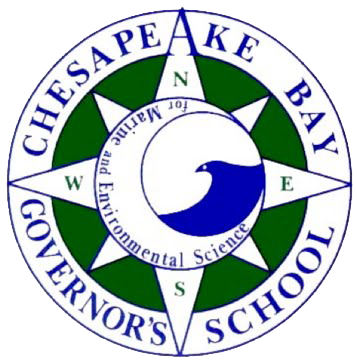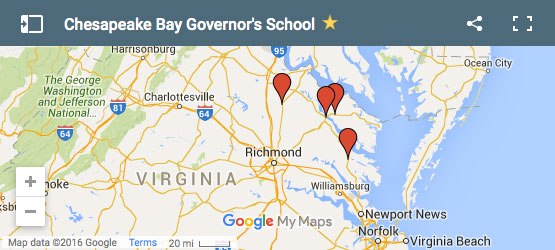SCHOOLOGY
RESOURCES
All CBGS courses meet and/or exceed the Virginia Standards of Learning (SOL) requirements. Students take a combination of the following courses:
Sophomore Year
Biology – RCC BIO 101/102; 2 semesters
4 dual enrollment credits/semester (total 8 credits); 1 high school credit
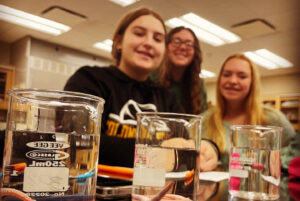 The biology course taught to the Chesapeake Bay Governor’s School sophomores will focus on those major concepts or themes deemed to be essential to an understanding of life processes. Throughout the year, science as a process will be emphasized as students conduct laboratory studies to support classroom information, use inductive reasoning to discover key concepts, study the history of the development of our present understanding of biological concepts, and learn how to conduct their own research. Other major themes to be emphasized are genetics, evolution, energy transfer, the relationship between structure and function, ecological interrelationships, the regulation of processes at many levels, and the impact of science and technology on our society. These concepts are all encompassing as well as recurring in all topics that will be covered throughout the year. This course, in conjunction with the topics course, will adequately prepare our students to succeed in their next two years at CBGS, in college, and in their future endeavors, as they will learn to focus their efforts and master essential study skills. CBGS Biology students will also be able to succeed on the Virginia Standards of Learning End of Course Biology Exam.
The biology course taught to the Chesapeake Bay Governor’s School sophomores will focus on those major concepts or themes deemed to be essential to an understanding of life processes. Throughout the year, science as a process will be emphasized as students conduct laboratory studies to support classroom information, use inductive reasoning to discover key concepts, study the history of the development of our present understanding of biological concepts, and learn how to conduct their own research. Other major themes to be emphasized are genetics, evolution, energy transfer, the relationship between structure and function, ecological interrelationships, the regulation of processes at many levels, and the impact of science and technology on our society. These concepts are all encompassing as well as recurring in all topics that will be covered throughout the year. This course, in conjunction with the topics course, will adequately prepare our students to succeed in their next two years at CBGS, in college, and in their future endeavors, as they will learn to focus their efforts and master essential study skills. CBGS Biology students will also be able to succeed on the Virginia Standards of Learning End of Course Biology Exam.
Algebra III/Advanced Mathematics with Algebra II – RCC MTH 161; 2 semesters
3 dual enrollment credits; 1 high school credit
This course covers advanced algebraic topics including the structure of complex number systems, polynomials, rational expressions, graphing, systems of equations and inequalities and functions, quadratic and rational equations and inequalities. Standards of Learning for Algebra II are taught but at a rigorous pace and additional depth. Thus, CBGS entering sophomores who have not had Algebra II may be awarded the verified credit for the course, but must be prepared to move through Algebra II material quickly. Topics from Math Analysis / Pre-Calculus are covered, as all students will extend their understanding of Algebra while tackling objectives to prepare them for Calculus, such as exponential and logarithmic functions; linear programming; and conic sections with analytic geometry.
* Note: 1 Algebra II credit can be awarded to a student without Algebra II prior to CBGS; OR 1 credit for Algebra III/ Advanced Mathematics can be awarded to students already having an Algebra II credit.
Foundations in Science – RCC SCT 111/112; 2 semesters
4 dual enrollment credits/semester (total 8 credits); 1 high school credit
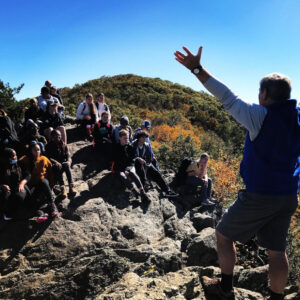 This course introduces the basic sciences which describe our physical environment, including the fundamentals of geology, meteorology, physics, chemistry, and biology. Students will explore scientific principles through data acquisition and analysis with a focus on the Chesapeake Bay Watershed and human impacts on the environment.
This course introduces the basic sciences which describe our physical environment, including the fundamentals of geology, meteorology, physics, chemistry, and biology. Students will explore scientific principles through data acquisition and analysis with a focus on the Chesapeake Bay Watershed and human impacts on the environment.
Junior Year
Chemistry – RCC 111/112; 2 semesters
4 dual enrollment credits/semester (total 8 credits); 1 high school credit
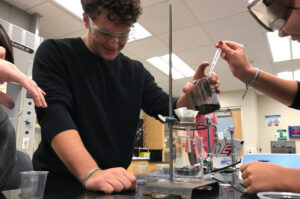 Students taking Chemistry at the Governor’s School will come from a variety of high school backgrounds. Although no prior chemistry is necessary and all of the Virginia Standards of Learning for the basic high school chemistry curriculum are covered, the college level of this course requires that students process information at a faster pace and cover the principles in much greater depth. This course explores the fundamental laws, theories, and mathematical concepts of chemistry and will cover the structure of matter, the characteristics of the states of matter, types of reactions, thermodynamics, chemical kinetics, equilibrium, and electrochemistry. The lab component of the course, which counts approximately twenty percent of the overall grade, will focus on qualitative and quantitative support of the general chemistry concepts
Students taking Chemistry at the Governor’s School will come from a variety of high school backgrounds. Although no prior chemistry is necessary and all of the Virginia Standards of Learning for the basic high school chemistry curriculum are covered, the college level of this course requires that students process information at a faster pace and cover the principles in much greater depth. This course explores the fundamental laws, theories, and mathematical concepts of chemistry and will cover the structure of matter, the characteristics of the states of matter, types of reactions, thermodynamics, chemical kinetics, equilibrium, and electrochemistry. The lab component of the course, which counts approximately twenty percent of the overall grade, will focus on qualitative and quantitative support of the general chemistry concepts
Trigonometry/Pre-Calculus – RCC MTH 162; 2 semesters
3 dual enrollment credits; 1 high school credit
In their junior year, CBGS students engage in additional Math Analysis/Pre-Calculus topics, adding to what they learned in their sophomore year and focusing on objectives of Trigonometry including evaluating trigonometric expressions (using both right triangle trigonometry and the unit circle), graphs of trigonometric functions, trigonometric identities, the laws of sine and cosine, polar equations, and more.
Marine & Environmental Science I – RCC MAR 201/202; 2 semesters
4 dual enrollment credits/semester (total 8 credits); 1 high school credit
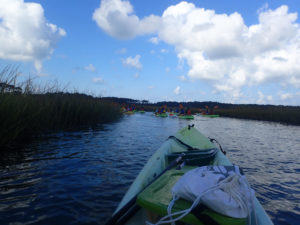 The first part of a two-year lab and field science course for juniors & seniors designed to provide thematic unity to the CBGS program and immerse students in rich experiential learning. Students will explore the principles of general ecology, evolutionary biology, environmental science, and oceanography, with special emphasis on the natural history and ecology of the Chesapeake Bay and its watershed as well as the Atlantic Ocean and east coast. The entire two-year course is interdisciplinary in spirit, stressing the importance of chemical, physical, and geological oceanography for understanding marine life and aquatic ecosystems, while making frequent connections to the mathematics and general sciences that students are learning in other CBGS courses. The curriculum will largely be driven by the data and investigations of real scientists, and students will design and conduct their own scientific research. In order to provoke critical thinking and creativity, the course will be organized around a set of abstract unifying concepts, vivid discovery experiences that require students to interpret their own careful observations, extended problem-solving missions, independent projects and presentations, and thorny environmental issues that compel thoughtful evaluation. A two–year research project will be required of all Chesapeake Bay Governor’s School students.
The first part of a two-year lab and field science course for juniors & seniors designed to provide thematic unity to the CBGS program and immerse students in rich experiential learning. Students will explore the principles of general ecology, evolutionary biology, environmental science, and oceanography, with special emphasis on the natural history and ecology of the Chesapeake Bay and its watershed as well as the Atlantic Ocean and east coast. The entire two-year course is interdisciplinary in spirit, stressing the importance of chemical, physical, and geological oceanography for understanding marine life and aquatic ecosystems, while making frequent connections to the mathematics and general sciences that students are learning in other CBGS courses. The curriculum will largely be driven by the data and investigations of real scientists, and students will design and conduct their own scientific research. In order to provoke critical thinking and creativity, the course will be organized around a set of abstract unifying concepts, vivid discovery experiences that require students to interpret their own careful observations, extended problem-solving missions, independent projects and presentations, and thorny environmental issues that compel thoughtful evaluation. A two–year research project will be required of all Chesapeake Bay Governor’s School students.
Senior Year
Physics – RCC PHYS 201; 2 semesters
4 dual enrollment credits; 1 high school credit
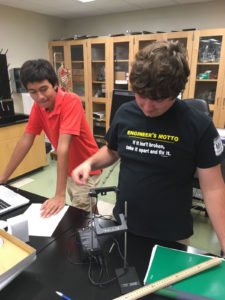 This is a 2 semester, college level, laboratory Physics course taught in the senior year, covering fundamental Physics principles, and their qualitative and quantitative applications. Topics include: mechanics; harmonic and wave motion; sound; optics; electromagnetism; thermodynamics; nature of matter; nuclear and quantum physics and relativity. Additional topics may be pursued depending upon time and interest. In addition to qualitative and quantitative understanding of topics, students will be required to use them for problem solving in laboratory applications. Strong mathematical skills are essential, particularly in Algebra and Trigonometry. In addition to strong math skills, the ability to handle independent reading and study is crucial. Pre-Calculus is a pre-requisite for this course. Calculus is a co-requisite, taken during this year, and may help with quantitative conceptualization.
This is a 2 semester, college level, laboratory Physics course taught in the senior year, covering fundamental Physics principles, and their qualitative and quantitative applications. Topics include: mechanics; harmonic and wave motion; sound; optics; electromagnetism; thermodynamics; nature of matter; nuclear and quantum physics and relativity. Additional topics may be pursued depending upon time and interest. In addition to qualitative and quantitative understanding of topics, students will be required to use them for problem solving in laboratory applications. Strong mathematical skills are essential, particularly in Algebra and Trigonometry. In addition to strong math skills, the ability to handle independent reading and study is crucial. Pre-Calculus is a pre-requisite for this course. Calculus is a co-requisite, taken during this year, and may help with quantitative conceptualization.
Calculus I – RCC MTH 263; 2 semesters
4 dual enrollment credits; 1 high school credit
This yearlong course presents analytic geometry and the calculus of algebraic and transcendental functions including the study of limits, derivatives, differentials, and introduction to integration along with their applications. Designed for mathematical, physical and engineering science programs.
Marine & Environmental Science II – RCC MAR 101/102; 2 semesters
4 dual enrollment credits/semester (total 8 credits); 1 high school credit
 The second part of a two-year lab and field science course for juniors & seniors designed to provide thematic unity to the CBGS program and immerse students in rich experiential learning. Students will explore the principles of general ecology, evolutionary biology, environmental science, and oceanography, with special emphasis on the natural history and ecology of the Chesapeake Bay and its watershed as well as the Atlantic Ocean and east coast. The entire two-year course is interdisciplinary in spirit, stressing the importance of chemical, physical, and geological oceanography for understanding marine life and aquatic ecosystems, while making frequent connections to the mathematics and general sciences that students are learning in other CBGS courses. The curriculum will largely be driven by the data and investigations of real scientists, and students will design and conduct their own scientific research. In order to provoke critical thinking and creativity, the course will be organized around a set of abstract unifying concepts, vivid discovery experiences that require students to interpret their own careful observations, extended problem-solving missions, independent projects and presentations, and thorny environmental issues that compel thoughtful evaluation. A two–year research project will be required of all Chesapeake Bay Governor’s School students.
The second part of a two-year lab and field science course for juniors & seniors designed to provide thematic unity to the CBGS program and immerse students in rich experiential learning. Students will explore the principles of general ecology, evolutionary biology, environmental science, and oceanography, with special emphasis on the natural history and ecology of the Chesapeake Bay and its watershed as well as the Atlantic Ocean and east coast. The entire two-year course is interdisciplinary in spirit, stressing the importance of chemical, physical, and geological oceanography for understanding marine life and aquatic ecosystems, while making frequent connections to the mathematics and general sciences that students are learning in other CBGS courses. The curriculum will largely be driven by the data and investigations of real scientists, and students will design and conduct their own scientific research. In order to provoke critical thinking and creativity, the course will be organized around a set of abstract unifying concepts, vivid discovery experiences that require students to interpret their own careful observations, extended problem-solving missions, independent projects and presentations, and thorny environmental issues that compel thoughtful evaluation. A two–year research project will be required of all Chesapeake Bay Governor’s School students.
Outdoor Adventures – RCC PED 183; 6 semesters
2 dual enrollment credits awarded senior year
Outdoor Adventures introduces outdoor activities with an emphasis on basic skills, preparation, personal and group safety, equipment selection and use. Over the three years at CBGS students will explore the ecology of the Chesapeake Bay watershed while camping, kayaking, and hiking on three overnight trips and several day trips. In addition, students will be required to keep a journal of their field studies. Students must attend all 3 major field studies.
